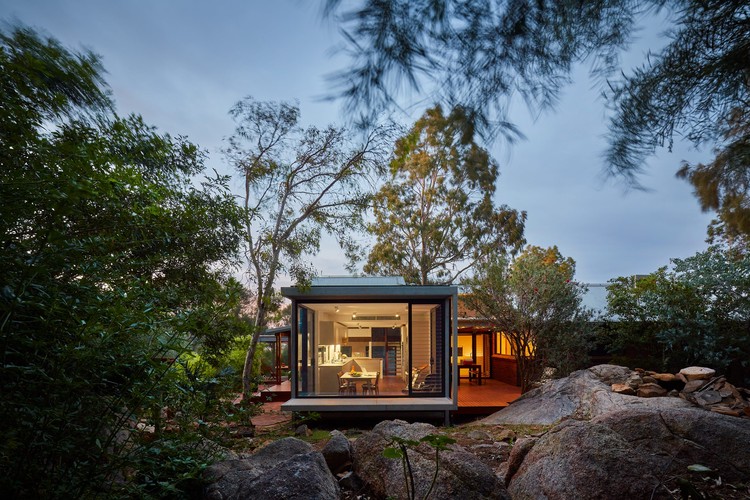
-
Architects: maarch
- Year: 2017
-
Photographs:Douglas Mark Black
-
Manufacturers: James Hardie Australia, AWS, James Hardie, Laminex, Remson Steel, Revolution Roofing

Text description provided by the architects. Located on a granite outcrop of the scarp, this small project is a restrained piece of contemporary design, a steel and glass box.

This site (near Darlington on the Perth Darling Range), required careful consideration of the placement of the architectural solution within the natural environment. The brief called for garden room and kitchen extension, plus interior and exterior renovation works that built upon the bones of an existing late 1970’s dwelling on the site.

The original building, largely of masonry (brown brick with concrete floors), offered good thermal mass qualities, but was inward looking and with generally low ceilings. The architectural solution was to extend north into the bush and allow for breakout spaces for outside living to occur either side.

The glass frames a view of the vegetation and rocks beyond, and establishes a relationship between the house and landscape setting that previously did not exist. An external bench seat in cement finish forms the garden edge. The design opens out towards the weather, the owners are at once transported deep into the landscape itself. In the morning and evening surrounded by birdlife with the sounds of insects at dusk.

The intervention quietly lands a modernist box in a foreign (almost alien) landscape. It feels like a long way from anywhere. The lights of the city below are only visible in the distance, still some sense of ‘otherworldy’ is here, particularly at dawn when the sky is cold.

Within this space, a well-designed interior is a sharp contrast to the primality of the landscape outside. This is not a spaceship, but feels like a functional and refined interior HQ. The Interior Cabinetwork design evolved through a close working relationship with Simone Meraldi, an Italian joiner. Plywood edge and grey laminate, reflecting a simple and reduced interior palette. The table was commissioned by local Furniture-maker Nathan Day, the plan had been to provide a new family space where the owners would be able to cook and sit whilst being able to keep an eye on a newborn.

The building integrates natural good ventilation principles, with breezeway louvres flushing out the warm air overnight with cooling easterly breezes and insect screens. Light and shade are balanced between old and new, achieved in an intelligent architectural solution. The project is successful in combining the interior spatiality with exterior rooms and views. These ancillary spaces support an indoor-outdoor lifestyle, where an awareness of the seasons is played out between the landscape and the house. In summer, these are entertainment decks where music and cooking happen. In winter the kitchen space is filled with light, or the rain plays out from the comfort of within.
Fundamentally constructed in timber structure by Hans Donni, a Swiss Builder whose careful attention to detail made this project a reality. The site is in a bushfire zone, but eliminated some of the risks by being built away from the upward slope, so the team succeeded in achieving open glazed areas where otherwise not possible. However, construction access to this site was not easy. Lightweight construction was chosen for practical reasons – avoiding footings in granite, speed and the inherent sustainability of wood. Cement sheet where required was used for protection to the frames. High levels of insulation in walls and glass selection were integrated to achieve optimum performance for the client.


































